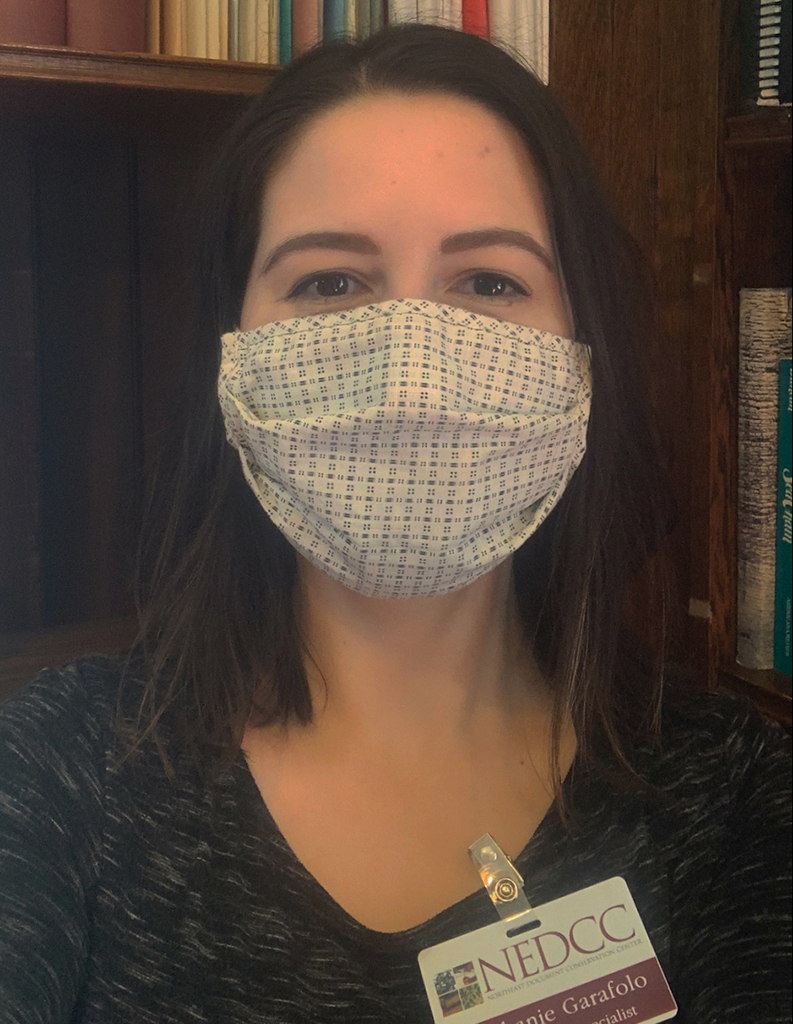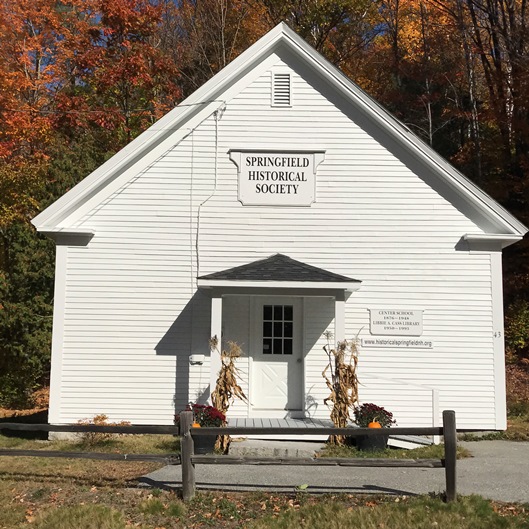Helping Organizations Move Forward with Preservation During COVID-19
A Preservation Needs Assessment is often the first step in an institution’s long-term preservation initiative, and can be a key building block for ongoing preservation planning activities.
 Staff at cultural organizations rely on the recommendations from an outside professional with an objective view. Many granting agencies now require assessments before funding storage improvements, conservation treatment, or digitization projects.
Staff at cultural organizations rely on the recommendations from an outside professional with an objective view. Many granting agencies now require assessments before funding storage improvements, conservation treatment, or digitization projects.
During 2020, the NEDCC Preservation Services team developed some creative ways to help organizations move forward with their preservation initiatives during the COVID-19 pandemic.
Since onsite preservation needs assessment visits were greatly reduced due to public health mandates, the staff designed a hybrid approach that incorporates strict safety protocols, limited in-person interaction, and extended online availability, allowing this critical planning work to move ahead.
Preservation Needs Assessments - During Normal Times
Ordinarily, a Preservation Assessment would include a full-day onsite visit (or a half-day onsite visit for a Pre-Assessment) during which the Preservation Specialist examines building and storage conditions, reviews materials and workflows, and identifies overall risks to collections. A Pre-Visit Questionnaire completed by the organization helps to focus the goal and scope of the upcoming assessment. During the onsite visit, the Specialist would also have ample time to meet in person with Board members, administration, and other stakeholders to discuss policies and procedures and to answer any questions they may have about ensuring the preservation of their collections.
Specialist would also have ample time to meet in person with Board members, administration, and other stakeholders to discuss policies and procedures and to answer any questions they may have about ensuring the preservation of their collections.
A Preservation Needs Assessment results in a comprehensive report presenting best practices, observations, and specific recommendations for phased improvement. The report includes an Executive Summary that can be presented to administrators and stakeholders, outlining short-, medium-, and long-term corrective strategies. The achievable goals outlined in the report can serve as a detailed check list to guide future preservation and conservation projects.
NEDCC’s Pre-Assessments were developed to accommodate smaller or newer organizations, and offer the same benefits as a full assessment. The scope is slightly narrower, so the site visit and the report are accordingly shorter, and the recommendations are designed to be completed within one to two years instead of five.
A Pre-Assessment in Springfield, New Hampshire Using the Hybrid Model
In August 2020, Preservation Specialist Becky Geller conducted a Pre-Assessment for the Springfield Historical Society and Museum (SHS) in New Hampshire. Established in 1984, the Society holds a variety of documents,  bound volumes, and objects representing the history of Springfield, NH, primarily from the 1800s-1950s. The majority of the SHS collections are stored in the historical Museum building, which is one of the original one-room school houses, and which has no plumbing or heating. The rest of the collections are in the climate-controlled New Hampshire Room at the nearby Libbie Cass Library.
bound volumes, and objects representing the history of Springfield, NH, primarily from the 1800s-1950s. The majority of the SHS collections are stored in the historical Museum building, which is one of the original one-room school houses, and which has no plumbing or heating. The rest of the collections are in the climate-controlled New Hampshire Room at the nearby Libbie Cass Library.
A Pre-Assessment report would help lay the foundation of preservation planning and practices in the small, all-volunteer Springfield Historical Society, focusing on no- and low-cost activities to improve the preservation outlook of the collections.
Instead of the customary half-day onsite visit, Becky Geller began by scheduling a one-hour online meeting with the Board of Directors to discuss concerns about the collections and the goals for the assessment. This was followed by a two-hour onsite visit on a different day to view the collection spaces. Following strict health safety protocols, just two members of the Board were present and Becky’s time onsite was limited. Everyone practiced social distancing and wore masks at all times. The hybrid virtual and in-person site visit project concluded a few days later with a one-hour, online wrap-up meeting to discuss the preliminary findings and to answer questions from Board members.
The resulting Pre-Assessment report outlined recommendations including:
- Refining the purpose, collections, and users of the SHS in the mission statement;
- Drafting and adopting an official Collection Development Policy that reflects the refined SHS mission;
- Inventorying the current collections and deaccessioning out-of-scope materials;
- Drafting and implementing a donation form (Deed of Gift) that clarifies ownership and establishes provenance; and
- Maintaining the Museum building to the highest degree possible and increasing the capacity to do so over time.
Becky Geller comments on conducting the assessment:
“Our hybrid model worked very well for the Pre-Assessment. I had enough time on-site for observation, and the before-and-after online meetings were a great way to connect with the whole group. We were all a little disappointed that only two people could join me for the site visit, but the ability to meet with me online (and to communicate through email if they wish) made that better.”
Springfield Historical Society Board President Jim Bednar sent a follow-up email to report on their progress:
“The Board of Directors have already met twice and have a new mission statement which we will approve at our next meeting September 22. That meeting will focus on the strategic plan and a timeline for 2021. A big thank you for your visit and debrief! It really energized the group and we are meeting at the museum next week! So, we are already moving forward.”
The momentum continues as Jim reports in a January 2021 message:
“Excited to report that the town’s Board of Selectmen approved funding for repairs and painting! As you recommended, we tore out the moldy carpeting and discovered markings on the floor where the school desks stood! And despite the snow and cold weather, we are proceeding with inventorying the collection. A membership drive and a barn raising to display farm utensils are in the works!”

As you recommended, we tore out the moldy carpeting and discovered markings on the floor where the school desks stood!
- Jim Bednar
A Preservation Needs Assessment in Abington, Massachusetts Using the Hybrid Model
Preservation Specialist Stephanie Garafolo conducted a Preservation Needs Assessment in June 2020 for the Abington Public Library, Abington, MA, using the hybrid model.
the Abington Public Library, Abington, MA, using the hybrid model.
The Abington Public Library was awarded a Massachusetts Board of Library Commissioners (MBLC) Preservation Assistance Grant to fund an assessment of their collections with special focus on their Wales Room Local History Collection, which contains material on the history of Abington, the South Shore, and Plymouth County, Massachusetts, and includes rare books, documents, manuscripts, maps, photographs, AV objects, high school yearbooks, annual town reports, newspaper clippings, and ephemera.
Stephanie outlines the sequence of events for this assessment:
“I began working with Library Director Deborah Grimmett at the end of January, 2020, right before the pandemic hit. We had anticipated conducting a site visit in March and had to adjust our expectations as the  public health crisis took hold. Our initial challenge was keeping up with the onslaught of information being released about COVID-19, as well as the state and national response/restrictions. We kept in touch during these initial months of the pandemic, and Deborah worked on the Pre-Visit Questionnaire during this time.
public health crisis took hold. Our initial challenge was keeping up with the onslaught of information being released about COVID-19, as well as the state and national response/restrictions. We kept in touch during these initial months of the pandemic, and Deborah worked on the Pre-Visit Questionnaire during this time.
In spring we decided to shift to a hybrid assessment model, so that we could conduct staff interviews remotely. We scheduled the remote interviews (one with Deborah and one with Reference Librarian Sarah Roberts) for the end of June and followed up with an onsite visit one week later in July. During the site visit, all parties followed the current Federal, State, and local regulations and guidance regarding cloth face coverings and social distancing. By separating the interviews from the site visit, I was able to focus on the building conditions and preservation environment, while also viewing a representative sample of the collections, without needing as much face-to-face time with library staff members.”
The resulting Preservation Needs Assessment report outlined recommendations including:
- Documenting the collection’s mission statement, policies, and procedures, especially regarding collection management;
- Supporting staff continuing education and training as it relates to caring for special collections;
- Physically stabilizing collections through improved storage and handling; and
- Developing collection disaster plans and procedures, and monitoring the storage environment.
Follow up comments from Deborah Grimmett: 
"Stephanie's assessment of our Wales Room local history collection was invaluable. She gave us a blueprint for developing policies and archival activities which will make the collection more accessible to the public. Stephanie and NEDCC worked with us to complete the project within our LSTA grant timeline, and following ever-changing COVID-19 safety protocols."
Conclusion
NEDCC’s Preservation Services Staff is pleased to have found a way to continue providing preservation assessments, advice, and expertise during the pandemic. Organizations have shown creativity and flexibility in moving forward with the recommendations outlined in their assessment reports by identifying work that staff can collaborate on remotely even when they don’t have physical access to their institutions. For example, working on an organization’s foundational documents, such as the institutional mission statement and collections development policy.
NEDCC looks forward to a time in the future when full-length assessment site visits can resume and collections are accessible to curators, researchers, and the public.
Story by Julie Martin, Becky Geller, and Stephanie Garafolo.
Many thanks to Jim Bednar and Deborah Grimmett for their help with the story.
NEDCC's assessment program is funded in part by the National Endowment for the Humanities. Any views, findings, conclusions, or recommendations expressed in this article do not necessarily represent those of the National Endowment for the Humanities.

